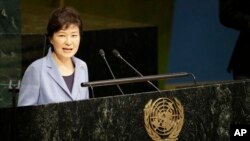South Korea on Wednesday expressed regret over North Korea’s threat to cancel a planned inter-Korean family reunion event.
Jeong Joon-hee, spokesman for South Korea’s Unification Ministry, called on Pyongyang to withdraw its threat, saying the reunions should not be canceled because of political disagreements between the two Koreas.
“It is very regrettable that North Korea unilaterally distorts and criticizes the president’s U.N. speech and threatens that the reunion, which is a humanitarian matter that the two sides agreed on, is in jeopardy, when the two Koreas should faithfully implement the August 25 agreement,” said Jeong in reference to an inter-Korean deal struck last month.
Jeong added Seoul will proceed with the necessary preparations for the event despite the North Korean threat.
Last month, the two Koreas agreed to take a series of steps to ease tension on the Korean peninsula and promote dialogue and exchanges between the two sides. As part of the deal, they agreed to hold a reunion for families separated by the Korean War six decades ago. The reunions are scheduled to start on October 20 at the Mount Kumgang resort in North Korea, with 100 participants from each side.
Harsh criticism
On Tuesday, North Korea threatened to cancel the reunions over comments by South Korea's president about Pyongyang's nuclear program and human rights records.
A spokesperson for the Committee for Peaceful Reunification of Korea, the North Korean body that handles affairs with South Korea, harshly criticized South Korean President Park Geun-hye’s speech at the United Nations Monday. She called for the denuclearization of North Korea and pressed the communist country to improve its human rights records.
“Reckless confrontation overtures by the South Korean authority put the hard-won reunions of separated families and inter-Korean ties on thin ice,” the spokesperson was quoted as saying by North Korea’s official Korean Central News Agency (KCNA).
Family reunions uncertain
Recently, concerns that the reunions could be derailed were raised after North Korea made a series of threats implying it might conduct a long-range rocket launch and nuclear test. Last week, North Korea state media said the reunion could be in danger of being cancelled because of anti-Pyongyang leaflets sent by South Korean activists.
Despite the threats, South Korea is making preparations for the event. Last week, South Korea dispatched a team of officials and technicians to North Korea to repair facilities at the resort.
This week, representatives from some 66,000 South Koreans, who applied for a reunion with relatives in North Korea, called for the reunions to proceed regardless of political relations between two Koreas.
“Allowing only 100 participants from each side is a symbolic gesture. We want the participants to be increased greatly. Given the challenges, at least exchanges of letters and postcards, along with information on whether our relatives are still alive should be allowed,” said Shim Koo-sup, who leads an association of South Koreans with families in North Korea.
In her speech to the United Nations General Assembly, Park laid out her vision for a unified Korea, pressing Pyongyang on touchy issues such as the country’s nuclear development and human rights.
Park warns against provocations
“Pushing ahead with provocations, including its nuclear development program, will undermine the values of humanity’s peace espoused by the international community and the U.N. have been espousing,” Park warned.
“We once again call on the DPRK to heed the concerns of the international community and start improving the state of human rights,” she said.
Park said a unified a Korea will be a “thriving democratic nation free of nuclear weapons and upholding of human rights.”
Chang Yong-seok, a senior researcher at Seoul National University’s Institute for Peace and Unification Studies, said Pyongyang is likely to reject Park’s idea.
“It is highly possible that North Koreans will take Park’s plan as an attempt to annex them,” said Chang.
Nam Gwang-gyu, a professor at Korea University, said Park’s speech was part of her government’s efforts to deter provocative actions from Pyongyang.
Park Hyung-jung, senior research fellow at Korea Institute for National Unification, South Korea’s state-run research institute, said Park’s message was measured to strike a balance between warning against provocations and the mood for inter-Korean dialogue.
“The president asked Pyongyang to refrain from provocative actions while stressing the need for a change by North Korea and working together toward reunification,” said Park.
Analysts say the fate of the reunions and overall progress in inter-Korean ties may depend on whether Pyongyang proceeds with its threats. Some suspect Pyongyang could fire a long-range rocket to mark the anniversary of the founding of the ruling Workers’ Party on October 10.
Kim Hwan Yong, Kim Eunjee and Jee Abbey Lee contributed to this report, which was produced in collaboration with the VOA Korean service.




